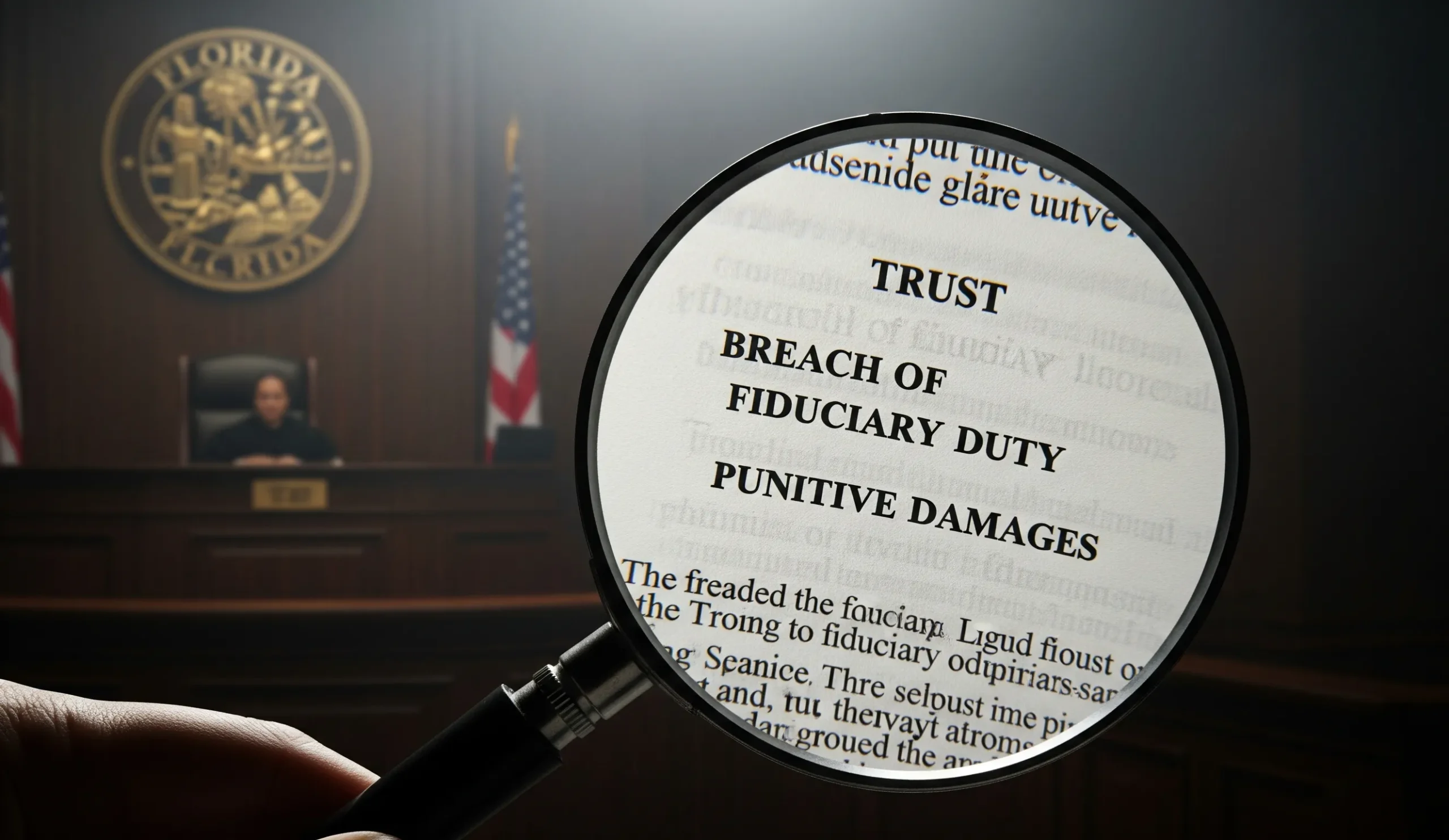Trust Litigation in Florida. When a Trust Needs a Firm Hand (and a Clear Plan)
Trusts are meant to provide clarity, protection, and smooth transitions, but when disputes arise, trust litigation may be the only way to restore order. A trustee may stop communicating, make questionable financial decisions, or fail to uphold fiduciary duties. Beneficiaries may suspect mismanagement, undue influence, or that a vulnerable family member was pressured or misled.
When a trust dispute escalates, it can bring administration to a standstill. Assets may remain frozen, distributions delayed, and relationships strained. That’s where our Florida trust litigation attorneys step in. At Smith Will & Trust, we protect beneficiaries, hold trustees accountable, and, when necessary, pursue trustee removal to safeguard the trust’s purpose with superior estate planning & trust services.
Our team leverages the Florida Trust Code (Chapter 736) to resolve conflicts efficiently and lawfully, ensuring compliance, restoring communication, and getting the trust back on track.
What Kinds of Trust Litigation Cases Do We Handle?
Trust conflicts take many forms. Our team sees patterns, and we know how to address them under Florida law.
Breach of Fiduciary Duty
In trust litigation, the most common disputes arise from a trustee’s breach of fiduciary duty. Trustees are legally required to act with loyalty, prudence, and impartiality toward all beneficiaries. When a trustee favors one beneficiary over another, makes risky or self-serving investments, or uses trust assets for personal gain, it may constitute a serious breach of trust.
Under Florida trust litigation law, beneficiaries have the right to pursue remedies such as damages, trustee removal, or court-ordered accountings. The attorneys at Smith Will & Trust use the Florida Trust Code (Chapter 736) to enforce these rights and protect the integrity of the trust.
Lack of Information or Accounting
In trust litigation, one of the most common disputes involves a trustee’s failure to provide information or accountings. Beneficiaries have a legal right to stay informed about trust assets, expenses, and administration. Under the Florida Trust Code (Chapter 736), trustees must deliver periodic accountings and respond to reasonable beneficiary requests for records and updates.
When reports are late, incomplete, or missing, our Florida trust litigation attorneys take action — compelling compliance, negotiating a resolution, or petitioning the court for an order requiring full disclosure and transparency.
Self-Dealing and Conflicts of Interest
Under Florida trust litigation standards, trustees cannot use trust property for personal gain or engage in transactions that benefit themselves, their businesses, or family members. Such actions may constitute self-dealing or a breach of fiduciary duty under the Florida Trust Code (Chapter 736).
Our Florida trust litigation attorneys review financial records, trace transactions, and identify conflicts of interest or misuse of trust assets. When appropriate, we petition the court to unwind improper transactions, surcharge the trustee, or recover losses to protect the beneficiaries and restore the integrity of the trust.
Trust Contests, Capacity, or Undue Influence
Trust disputes may arise when a settlor lacks capacity or is subject to undue influence—two common triggers for trust litigation under Florida law. Florida does not enforce “no-contest” or “in terrorem” clauses in trusts, so beneficiaries can challenge a trust or amendment without automatically forfeiting their rights.
In such litigation, our team builds cases with diligence: we gather medical evidence, obtain witness testimony, and review financial records to either defend or invalidate the trust based on sound legal standards. We rely on the Florida Trust Code (Chapter 736) and guidance from leading commentary.
Trustee Removal or Suspension
Under Florida trust litigation standards, courts may remove a trustee when it serves the best interests of the beneficiaries and does not violate the trust’s original intent. Grounds for removal include breach of fiduciary duty, fraud, mismanagement, or persistent failure to perform essential trustee duties.
At Smith Will & Trust, our Florida trust litigation attorneys prepare and file formal petitions for trustee suspension or removal under the Florida Trust Code (Chapter 736) and related provisions. We rely on proven case law and commentary from the Florida Bar’s Real Property, Probate & Trust Law Section and Florida Bar Journal analysis to support our petitions and ensure that removal actions are both justified and compliant with Florida law.
Our goal in every trust litigation matter is to protect the beneficiaries’ interests, restore proper administration, and preserve the trust’s assets so it can fulfill its intended purpose.
What Does the Court Actually Do in Trust Cases?
Florida courts have broad authority under the Florida Trust Code when it comes to trust litigation. Depending on the facts, a judge can:
-
Compel a trustee to perform duties that were ignored.
-
Enjoin a trustee from committing further breaches.
-
Order a full and detailed accounting of trust assets.
-
Suspend or remove a trustee and appoint a qualified successor.
-
Award damages or order a trustee to restore mismanaged funds.
Time matters in trust litigation. Florida has strict statutes of limitation for bringing breach-of-trust claims. Waiting too long can permanently bar recovery. Our firm moves quickly to investigate and file before the window closes.

Our Step-by-Step Trust Litigation Process
We know that trust disputes are stressful, so we keep our process clear and focused on resolution.

Triage and Freeze Risk:
We review the trust, collect financial records, and take urgent steps to prevent further harm. If needed, we seek emergency court orders to freeze accounts or suspend trustee powers.

Map the Issues :
We identify what duties were breached, who is affected, and what remedies are available under Chapter 736.

Demand, Negotiate, or File :
Many disputes can be resolved without a trial. We send formal demands, mediate disputes, or, when necessary, file petitions supported by a clear theory and evidence.

Remedy and Handoff:
We pursue accountings, trustee removal, damages, or negotiated settlements. Once the trust is back on track, we provide guidance to keep it running smoothly going forward.
This approach minimizes disruption and legal costs while protecting beneficiaries.

Why These Cases Require Experienced Counsel
Trust litigation is one of the most complex areas of Florida law, blending probate procedure, fiduciary duty, and financial forensics. A poorly handled trust dispute can:
-
Drain trust assets through attorney fees and delays.
-
Leave beneficiaries waiting years for distributions.
-
Create permanent family conflict that outlives the case.
Our Florida trust litigation attorneys balance efficiency with accountability. We know the Florida Trust Code and understand how to collaborate with trustees, financial institutions, and the courts to achieve timely results. With extensive trust litigation experience, we pursue resolution through negotiation—but are always prepared to litigate when necessary.
The Human Side of Trust Litigation
Legal disputes are not just about money. They affect relationships and family dynamics. We aim to reduce conflict where possible, using mediation and clear communication to keep beneficiaries focused on solutions. At the same time, we stand firm when misconduct threatens the trust’s purpose.
Who We Represent
- Beneficiaries: Seeking information, distributions, or protection from trustee misconduct through trust litigation.
- Trustees: Needing legal guidance in trust litigation to perform duties properly, respond to allegations, and avoid liability.
- Co-Trustees: Facing internal disputes about how to administer the trust or interpret fiduciary duties.
- Successor Trustees: Stepping in after a trustee’s removal or resignation and requiring direction to restore proper administration.
- Out-of-State Beneficiaries: Managing Florida trust interests from a distance and relying on our trust litigation attorneys for representation in local courts.
Signs You May Need a Trust Litigation Attorney
- The trustee has stopped responding to emails or calls.
- Accountings are missing, unclear, or years overdue.
- Assets have disappeared or been sold under suspicious circumstances.
- A family member amended the trust shortly before death.
- Distributions are delayed without explanation.
If you recognize one or more of these warning signs, legal advice can prevent further damage and protect your rights.
Where We Meet (and Who to Call)
Proudly serving Tampa, Brandon, Riverview, and SouthShore with trusted estate planning and trust services you can count on.
- Smith Will & Trust: 4830 W. Kennedy Blvd., Suite 600, Tampa, FL 33609
Practical FAQs
Can a trustee be removed without “blame”?
Yes. Florida law allows trustee removal when it best serves the beneficiaries and does not violate the trust’s material purpose, even without proven misconduct. This is often used when a trustee is simply unresponsive or overwhelmed.
Are beneficiaries entitled to information?
Absolutely. Trustees must keep qualified beneficiaries reasonably informed and provide regular accountings. Failure to do so can result in a court order and, in some cases, trustee removal.
Are no-contest clauses enforceable in Florida?
No. Florida statutes make “in terrorem” clauses unenforceable. Beneficiaries cannot lose their rights for contesting a trust in good faith.
How long do I have to bring a claim?
Deadlines vary depending on whether a statutory limitation notice was sent, but the window can be as short as six months for certain claims. Early legal action preserves options and prevents forfeiture.
